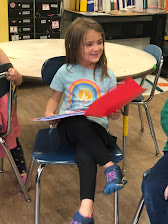Dear Parents and Caregivers,
Let me take a minute explain my theory of language and learning so that you have a better understanding of what we do in the classroom and a better explanation of student outcomes.
A lot of us remember high school language classes with long vocabulary lists, conjugation drills, and grammar rules. Lots of grammar rules. Spelling counted. Points were taken off for missing accents. Instruction was organized in a Presentation - Practice - Perform sequence, and we were led to believe that if our nouns and adjectives didn't "match" or if our subject didn't agree with the verb, no one would understand us.
The thing is, those types of errors don't impede comprehension. We understand the message in spite of the mistakes. The errors that really impede communication are lack of vocabulary and poor pronunciation.
A communicative approach to language teaching has students using language for the purpose of communicating. We have no vocabulary lists, no drills, we rarely translate. Instead, we read books, we create stories together, we have even done science. Students make lots of errors and I take them as positive evidence of their learning and a window into their thinking 💭 about language. It's important to note that these errors occur in the process of real communication, not fill in the blank exercises or random sentences that they're asked to write.
Students are also encouraged to use bridge words. This is using a word or two of English to keep the student from becoming stuck. Bridge words encourage production without anxiety.
Here's what we're doing now:
At Prosper Valley, the fifth grade has the target vocabulary of se sienta, se levanta, and le grita. Ask what those mean.
The sixth grade has been reading about popular foods 🍫 ☕ 🍋 in Latin America with a particular focus on elote. We read a love letter to elote and now are writing 💖 love letters 💖 to something special to each of us. Ask your student what they are writing their love letter to (the most interesting I've noticed so far is pickles and chocolate) and to tell you all about elote.
At Barnard, the fives and sixes are have the target vocabulary of tienes que, puede, le ayuda, and simpático/a. Ask what they mean.
The 2-3-4 group will be putting on a fashion show! 👗👕👖We are very excited about this and have been working very hard on it.
And finally, the Kindies and Firsties have learned about the Ancient Aztecs and are now discovering the Ancient Inca. We will be comparing the two groups and will end the Inca unit with a (virtual) field trip to Machu Picchu.



Comments
Post a Comment